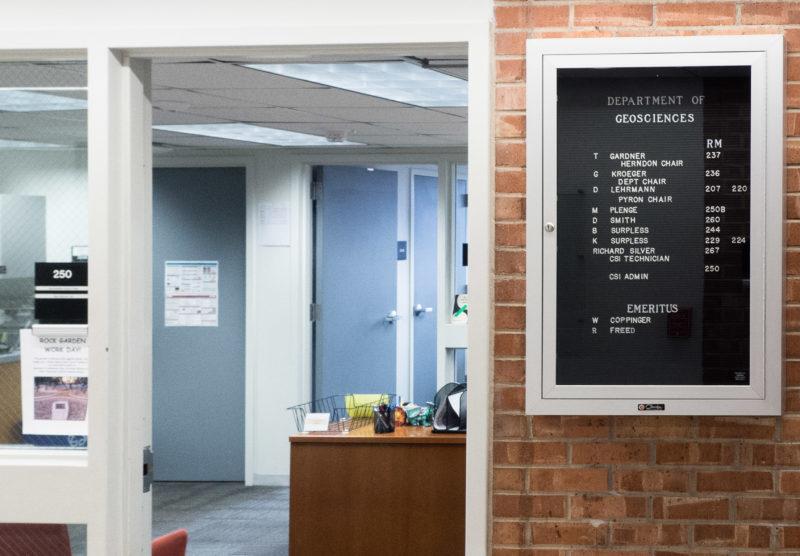Faculty seeking among qualified candidates to offer students new research opportunities
The geosciences department is giving students the opportunity to give input about the candidates that may replace the Herndon Distinguished Professor. This allows students to offer feedback that may influence the direction of the department in the coming years.
Four candidates will be coming in the upcoming weeks to give presentations about their research and to engage with geoscience majors on campus. The department has been searching nationwide since the fall semester.
“We had a whole lot of applicants from across the country “” it’s a national search “” and the idea is that the person has to be a full professor before they’re even eligible for the position. We narrow the applicants and chose four to come to campus,” said Benjamin Surpless, professor in the department.
Because the candidate will be filling an endowed position, the search is much more complicated than the search for a junior faculty member would be. The candidates are all full professors that have their own research programs in place.
“We’re hiring someone who is already a professor, and we have to attract them from what is already a good job by convincing them that this is a better one,” said Glenn Kroeger, interim chair of the department.
Because the professor will be coming from another institution and with well-established research, the geosciences department will highlight the features of being part of Trinity STEM faculty.
“Our department has been giving degrees for 50 years, we have a very substantial national reputation in terms of the quality of our graduates that go on to graduate programs, we have the availability of shared equipment with other STEM departments, and we have many resources in terms of research and finances,” Kroeger said.
In determining who will fill the position, the department is focusing its search on the availability of student research and how the professor will interact with students.
“Out of all the things we’re looking for in a candidate, what is most important to us as a department is what kind of research they will bring that Trinity students can be involved with,” Kroeger said.
Just because a professor has developed research, the department is more concerned with whether the professor will make students active participants in their research, and whether their research will help generate senior theses, presentations and papers.
“In the case of an endowed chair like ours, we’re looking for someone who already has a well-established research program, but has also demonstrated the ability to involve undergraduates with that research and is willing to come to a place where they won’t have graduate students,” Kroeger said.
All students are welcome to attend the presentations that these candidates will be giving; however, not many non-majors do. These presentations give students and faculty the opportunity to see what the professor’s research focuses on.
“In terms of curriculum and research, we have to think about where we want the department to go in a decade or two because this person is going to be here at least a decade, if not 20 years,” Kroeger said.
Currently, there are no professors at Trinity who focus entirely on environmental studies; there are a few who have connections to it, but there are none who have focused on it their entire career. This vacancy offers an exciting faculty addition.
“Our belief is that the future of geoscience, not just at Trinity but globally and nationally, is going to be more involved with things like climate change and water-environmental issues, so we’re looking for someone whose research specialty and teaching abilities are in that region,” Kroeger said.
The candidates will meet with more than just the students; other faculty members and administration are involved in the hiring process as well.
“The candidate comes on campus and meets with everyone in the department individually. They meet with people in administration and people in other departments, too,” Surpless said.
Although the decision ultimately lies with administration, the department emphasizes the importance of student feedback in the process. Along with the presentations, there will be a lunch with each candidate and a small group of geoscience majors.
“A talk is formal, and of course the students meet the speaker before, and there’s time after for questions, but an hour and a half lunch is a chance for a small group of students to talk about all kinds of things with no faculty around,” Kroeger said.
Students see the importance of this, too. Personal discussion like this allows students the opportunity to discuss research and teaching methods on an informal level.
“I think, unlike most universities, so much of the education experience at Trinity is great because of the interaction between the professors and students. It’s important that students and potential professors are able to communicate effectively,” said senior Brendan Powers, a geoscience major.
Normally, the budget only allows three candidates to come to campus. However, because the department takes student input so seriously, money was taken out of the department to fund a fourth candidate. The department has looked at the applications and has interviewed the candidates over Skype, but they want to see how the candidates will react with students.
“We have a group of students who have agreed to go to all of the candidates’ talks. We will solicit input from all of the students, but the nice thing about the group is that we know they will have seen all the candidates and will be able to provide comparison,” Kroeger said.
The candidates for the position will come over the course of the next few weeks, and the department hopes that, by spring break, they will be in the position to make an offer and begin negotiating.







